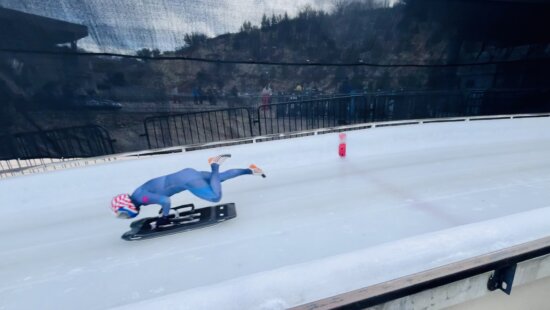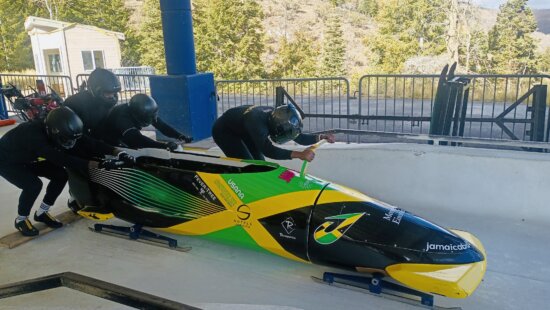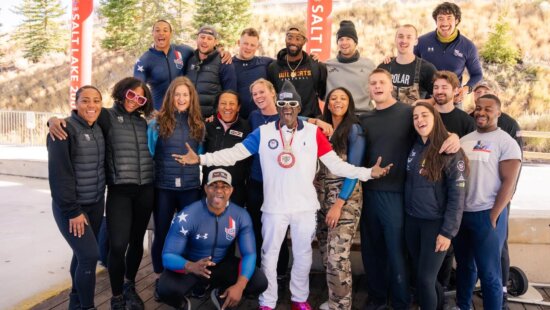Olympics
Wheels to runners: Brazil’s bold Olympic bobsleigh experiment is taking hold
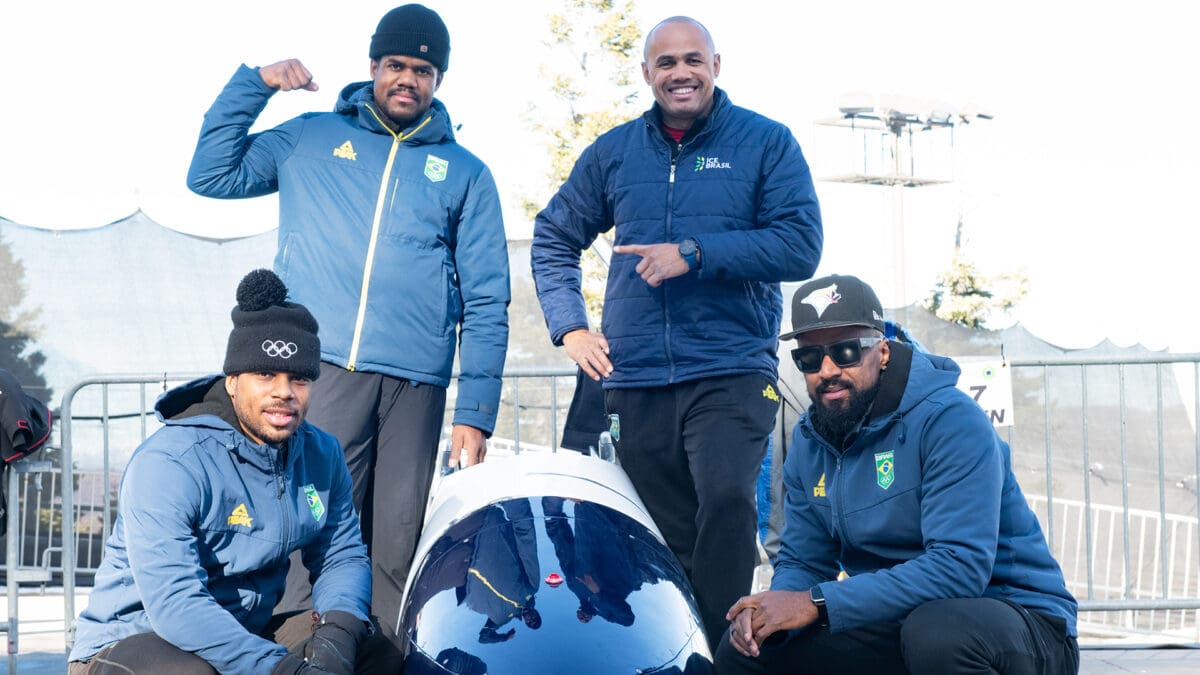
Brazil's 4-man bobsled team, poses for a team photo before a training run on Thursday, December 5 at the Utah Olympic Park. Edison Luques Bindilatti, standing right, along with brakemen Rafael Souza De Silva, Jeronimo Gilson Vianna, and Edson Ricardo Martins. Photo: TownLift // Randi Sidman-Moore
PARK CITY, Utah – On a cold winter morning at the Utah Olympic Park, Brazil’s bobsled team is preparing for another day on the track. With their signature grit and camaraderie, they’re rewriting the narrative of their underdog status. Leading the charge is Edson Bindilatti, a five-time Olympian who has been the heart and soul of Brazil’s bobsled program since his debut at the 2002 Winter Games in Salt Lake City.
Bindilatti, originally a decathlete, transitioned to bobsled in 2000. His athletic prowess and determination helped Brazil make its Winter Olympics debut. Over the years, he’s gone from brakeman to pilot, guiding the team through highs and lows across four additional Olympic appearances, including their best-ever finish of 20th in the two-man event at the 2022 Beijing Games. At 45, Bindilatti is now focusing on preparing the next generation while continuing to race.
“Edson is the glue that holds this team together,” said Jo Manning, the team’s manager. “He’s a leader on and off the track, finding and mentoring new athletes while still competing at the highest level.”
So far, Bindilatti and his three brakemen are off to a great start currently leading the North America Cup standings ahead of both the USA and Canada. The team drove to a third and second place finish in Whistler’s opening races on a track that many consider the most difficult in the world. Here in Park City at the UOP, the Brazilians raked in more points with two more third-place finishes. On the Canadian track, only the Canadians beat Bindilatti and here on the American’s home track, only the U.S. guys drove faster lines – a sign that the Brazilians are really putting things together.
“I believe my team is very in tune,” Bindilatti said. I think this trust we have in each other makes it possible for us to have these great results. And there is a lightness to the team.”
Bindilatti continued, explaining that the team has three key things going for them right now – their attitude is light and they have fun doing what they’re doing, they are united and they are committed to the same objective.
From Laughter to Legacy
Brazil’s early years in bobsled were marked by struggles, often drawing comparisons to the Jamaican bobsled team made famous by the film Cool Runnings. In Sochi 2014, the team faced public ridicule when technical issues led to subpar performances, and a viral image of Brazil’s women’s sled flying off the track didn’t help their reputation.
But Manning, who began working with the team after the 2014 Games, saw untapped potential. “They were phenomenal athletes who just needed proper coaching and resources,” she said. Manning spearheaded a pilot project, collaborating with the International Bobsleigh and Skeleton Federation to provide emerging nations like Brazil with additional training runs.
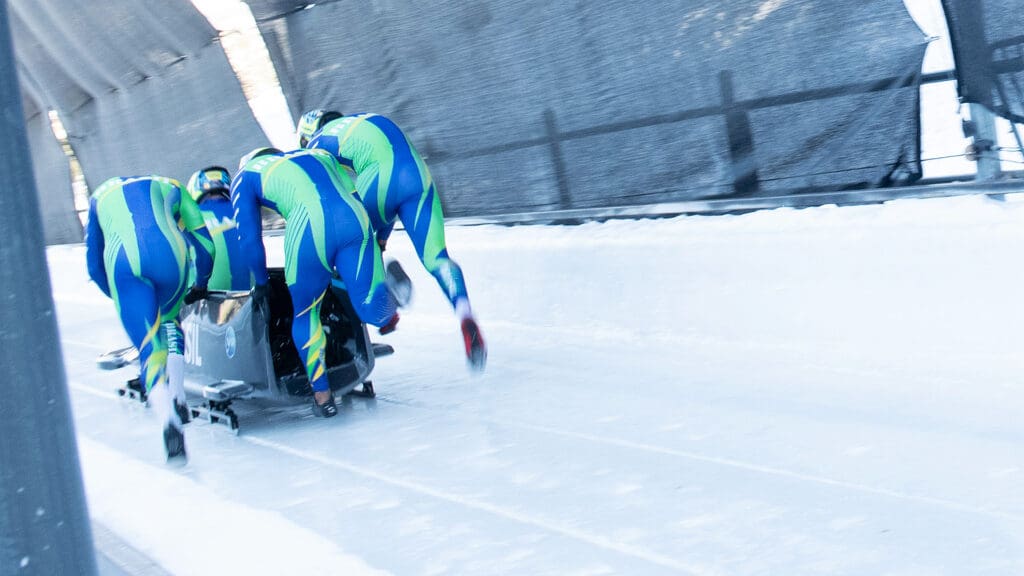
In one season, the Brazilian team went from crashing regularly to winning the Americas Cup under Bindilatti’s leadership. “The transformation was incredible,” Manning said. “It wasn’t just about bobsledding; it was about teaching them how to train, live, and compete like professionals.”
Building for the Future
Despite their growth, the team operates on a fraction of the budget enjoyed by bobsled powerhouses like Germany and the United States. Manning recounted how the athletes often sleep on air mattresses, cook their own meals, and share accommodations to save costs. “The Germans have mechanics and physios; we have grit and determination,” she said.
A key focus for the team is developing 21-year-old pilot Gustavo Ferreira, who competed at the 2020 Youth Olympic Games. Recognizing Ferreira’s potential, Bindilatti and Manning devised a plan to mentor him while ensuring Brazil maintains its Olympic presence. With new rules requiring pilots to compete in both two-man and four-man events to qualify for the Winter Games, the team faces additional challenges in preparing Ferreira for the 2026 Games in Milan-Cortina.
“Learning to drive a four-man sled is a completely different skill set,” Manning explained. “It’s heavier, less forgiving, and requires a whole new level of precision.” To fast-track Ferreira’s development, the team has been rotating him into four-man events alongside Bindilatti, who continues to mentor the younger pilot.
A Community Effort
Brazil’s bobsled team has also become a source of pride and inspiration in the international bobsled community. Known for their willingness to help others, the team often pitches in at the track, assisting less-experienced nations with equipment and advice.
“It’s amazing to see how far they’ve come,” Manning said. “Years ago, people overlooked them. Now, other teams come to us for help. That’s the kind of respect they’ve earned.”
The camaraderie extends beyond the track. The athletes’ resourcefulness and teamwork have created a unique bond, one that Manning believes is crucial to their success. “They might not have the best equipment or the biggest budget, but they have heart, and that makes all the difference,” she said.
The energy the team exudes at the track stands out from some of the other teams, who seem far less happy to be be there in comparison. The Brazilians joke with one another, smile and even break out samba dance moves after their warmup and all their race prep work is done.
“The secret is to love what you do, right?” Bindilatti said. It’s not easy to be away from family, but when you know everyone has the same goal, the same vibe, the family is rooting for you, it makes you so much stronger that you feel light-hearted about what you came here to do. I have this smile on my face and this joy of being able to do what I like the most.”
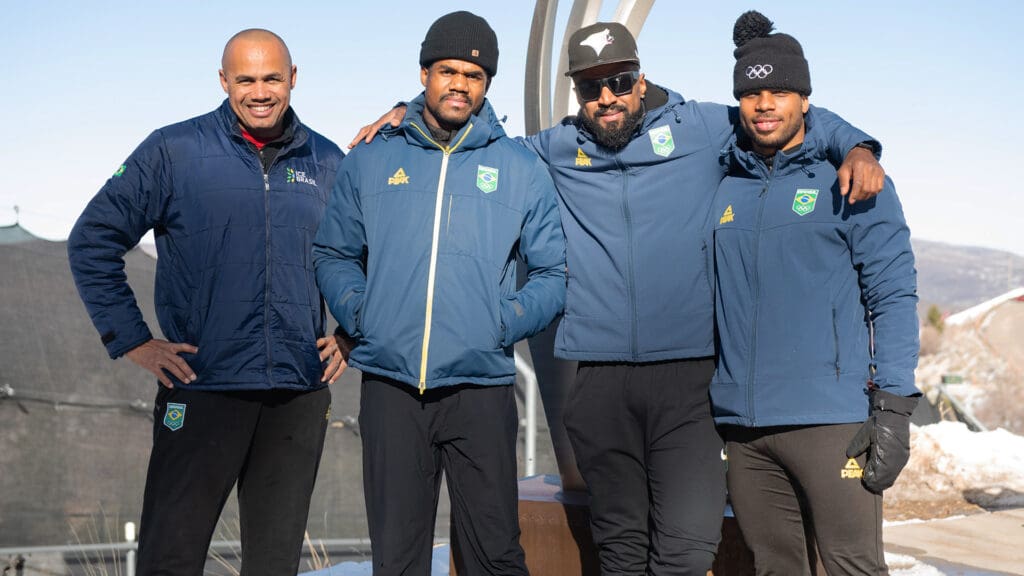
Looking Ahead
As they prepare for the next Olympic cycle, Brazil’s bobsled team is balancing immediate competition with long-term development. Bindilatti, who turns 46 this March, has hinted that the 2026 Winter Games could mark the end of his competitive career. In the meantime, his focus remains on fostering the next generation and proving that Brazil belongs among the world’s bobsled elite.
“We’re not just here to participate; we’re here to compete,” Manning said. “With the right support, this team can achieve great things, and I’m proud to be part of that journey.”
Brazil’s story is one of resilience, resourcefulness, and relentless drive—a testament to what can be achieved when passion outweighs obstacles. As Manning puts it, “This team is a family, and together, we’re building something extraordinary.”
















